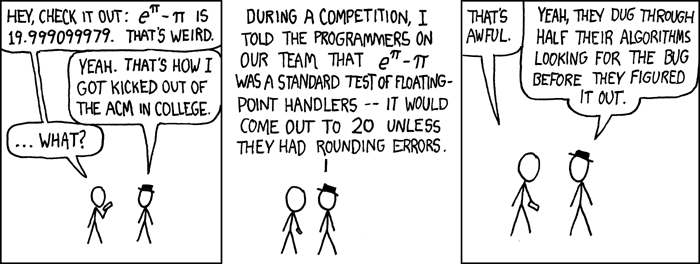There's no way that I'd believe e^π^−π to be an integer without seeing a proof
xkcd
A community for a webcomic of romance, sarcasm, math, and language.
e^iπ tricks you into thinking e is magic.
It.... Kinda is?
Nature has quite a special place for the basis of the natural logarithm.
Not gonna lie, had to test it for myself, using emulated MK 61/54 calculator: https://f-droid.org/en/packages/com.cax.pmk.ext/
Got 19.999097. Rounding errors or a bug in the microcode, who knows.
Makes me think that if there is a God, this would be an easter egg.
I get that it's a comic but this doesn't feel like a conversation that would ever occur in real life. Granted I don't hang out with programmers or mathematicians so maybe it's more plausible than you would think.
would ever occur in real life
That's sort of part of the joke. ACM is the "Association for Computing Machinery" one of the biggest and oldest and nerdiest computer clubs.
ACM hosts all kinds of SIGs (special interest groups) - clubs dedicated to interest in (sometimes deeply esoteric) aspects of computer science. For a few of them, hand-coding a new specialized fast floating point calculation code during a contest could easily come up.
And ACM has a code of ethics, so it is technically possible to get kicked out.
So there's technically a situation where lying to a peer, on purpose, in a particularly mean context (such as a competition) about a floating point number computation - could actually get someone kicked out of ACM.
Edit: Additonal context that helps the joke - my experiences with ACM have all been super chill , relaxed and friendly. So "I got kicked out of ACM" is also a "you did what?!" setup for the joke.
Thanks for the context on ACM saving me a search. I would like to add that I wouldn’t characterize it as ‘mean’ but moreso trolling them for being unaware of Gelfond’s Constant.
My kid is studying physics in university, and she comes home and tells me physics anecdotes which I don't understand, so I always reply "That's Numberwang!".
So I can see these types of conversations happening between math and programming types.
That is a truly excellent response! Anyone in this thread who hasn't seen "That Mitchell & Webb Look" should go watch it - you're in for a treat.
Spin the board!
It seems plausible enough to me. Many comp sci undergrads would be dimly aware that floating point arithmetic is notoriously difficult to get right and can often lead to surprising errors if you get it slightly wrong, and also dumb enough to believe that e^π^−π is exactly 20.
Comics are not only meant to present something that can happen IRL :P
That kind of trolls happen occasionally in IT, where not everybody know well about maths and physics, they may easily fall into these kind of traps by taking granted that the maths you gave is more trustful than computer code they wrote (usual kind of joke to make your friend understand that he what was doing something wrong or without understanding)
Also, in Uni, we were all little Satans, trying more to break others students works instead of trying to improve self (that was a true war among IT students). All means were used, this kind of troll (as depicted in this comics) to make the other loose time is truly expected
Classical "type Alt+F4 before saving your code to automatically fix bugs" kind of joke
Oh grad school man. Yes it would. I was also amazed that there would be people sitting at the bar who could read hieroglyphics. And random shit like that.
I did a physics degree. The start is the sort of random stuff that would come up down the pub (in the evenings). I could easily see a conversation like this happening (at least the start).
This is totally a conversation that would happen in real life. I've watched a friend of mine try to convince someone who had a bit much to drink that the primes are closed under multiplication for an hour. Absolutely hysterical
